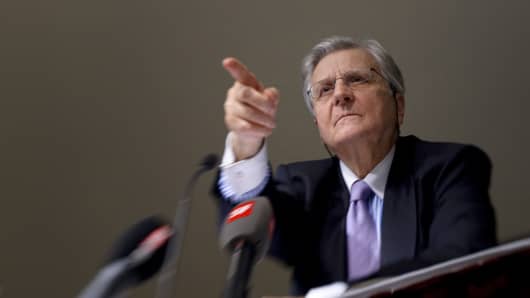Jean Claude Trichet said a new program put in place by his successor at the European Central Bank “is of extreme importance, not only for Europe, not only the EU area, but the entire world.”
Trichet said he believes the program will work, as long as “governments, individually and collectively, deliver.”
Mario Draghi, the current head of the European Central Bank, announced last week the central bank would buy the debt of countries suffering from very high interest rates, in a new program called Outright Monetary Transactions, or OMT. However, the countries would have to agree to strict conditions and monitoring of those conditions by the European Union, and would lose the support of the ECB if they failed to adhere to them.
Trichet went on to say: “I trust that what has been done in the case of Europe is commensurate to the gravity of the situation. But it has to be checked …. It has to be very, very closely checked.”
The Frenchman, who is looking far more relaxed than when he was in charge of the ECB, would not comment directly on the moves announced by U.S. Federal Reserve Chief Ben Bernanke yesterday, except to say they demonstrate that central banks of nearly all advanced economies are taking “non-standard measures” in order to fight the financial crisis.
Bernanke announced that the Fed would buy mortgages and other assets in an effort to improve the employment levels in the U.S. (Central bankers call the process of buying assets “increasing the size of the balance sheet.”) (Read More: Dovish Fed Surprises Markets, but Will Stock Rally Last?)
Trichet said: “We have the same order of magnitude of increase of the size of the balance sheet in all advanced economies. Japan, U.S., U.K., yeah, you name it. And that means that something doesn’t work currently in our economies.”
In what some may see as a change in position, Trichet said that, in the future, holders of senior debt in banks should not be spared losses in the event of a bank’s failure. Up until now, that has been in the case.
In fact, it was Trichet himself who told the Irish government that it could not impose losses on holders of senior debt in one of its major banks. As a result, the country sought a bailout in order to pay them.
Trichet said he did not want to impose losses on bondholders in Ireland, because it was a moment of crisis, and he did not want a repeat of the chaos that followed the failure of Lehman Brothers, in which bondholders did suffer losses. (Read More: Ireland to Stick to Austerity Program: Deputy PM.)
Trichet said that, in the future, once there is European banking reform, or a “permanent regime in normal times,” investors will have to accept the risks they are taking and, “if it is the case, losses.”
"We should not have a permanent regime in the future where you will have ‘too big to fail’ or ‘too interconnected to fail.’ ‘Too complex to fail,’ and so forth. That’s over. That should be over,” he said. “Now, if you are coping with a dramatic crisis, this is another story. And you have to make a judgment.”
While many economists see ECB President Mario Draghi and Trichet as miles apart when it comes to the implementation of monetary policy, it is clear that Trichet doesn’t see such a wide gulf.
When it comes to buying sovereign debt, he points out the ECB bought sovereign debt in unlimited amounts twice while he was running the institution. And that the “current adaptation” of requiring countries to agree to certain conditions in writing is appropriate to the current circumstances.
—By CNBC’s Michelle Caruso-Cabrera; Follow Her on Twitter @MCaruso_Cabrera



